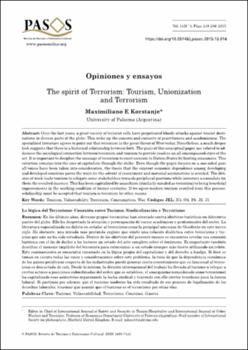The spirit of Terrorism: Tourism, Unionization and Terrorism
Fecha
2015Resumen
Over the last years, a great variety of terrorist cells have perpetrated bloody attacks against tourist destinations
in diverse parts of the globe. This woke up the concern and curiosity of practitioners and academicians. The
specialized literature agrees to point out that terrorism is the great threat of West today. Nonetheless, a much deeper
look suggests that there is a historical relationship between both. The goals of this conceptual paper are related to addressee
the sociological connection between terrorism and tourism to provide readers an all‑encompassed
state of the
art. It is important to decipher the message of terrorism to exert coercion to Nation‑States
by hosting consumers. This
extortion remains into the core of capitalism through the strike. Even though the paper focuses on a one‑sided
gaze
all voices have been taken into consideration, the thesis that the existent economic dependence among developing
and developed countries paves the ways for the advent of resentment and material asymmetries is avoided. The division
of work leads tourism to relegate some stakeholders towards peripheral positions while investors accumulate for
them the resulted incomes. This has been capitalized by anarchism (similarly‑minded
as terrorism) to bring beneficial
improvements in the working condition of former centuries. If we agree modern tourism resulted from this process,
scholarship must be accepted that tourism is terrorism by other means. En los últimos años, diversos grupos terroristas han atentado contra objetivos turísticos en diferentes
partes del globo. Ello ha despertado la atención y preocupación de varios académicos y profesionales del sector. La
literatura especializada no dubita en señalar al terrorismo como la principal amenaza de Occidente en este nuevo
siglo. No obstante, una mirada más profunda sugiere que existe una relación dialéctica entre terrorismo y turismo
que aún no ha sido estudiada. Dentro de los objetivos del presente ensayo se encuentra revelar esa conexión
histórica con el fin de darles a los lectores un estado del arte completo sobre el fenómeno. Es importante también
descifrar el mensaje implícito del terrorista para extorsionar a un estado siempre más fuerte utilizando un rehén.
Este razonamiento se encuentra enraizado en la lógica propia del capitalismo y del derecho a huelga. Si bien se
toman en cuenta todas las voces y consideraciones sobre este problema, la tesis de que la dependencia económica
de los países periféricos respecto de los industriales puede generar cierto resentimiento que es funcional al terrorismo
es descartada de raíz. Desde lo interno, la división internacional del trabajo ha llevado al turismo a relegar a
ciertos actores a posiciones subordinadas del orden que se establece, el anarquismo (considerado como terrorismo)
ha capitalizado esas asimetrías organizando la lucha sindical y trayendo con ello ciertos beneficios para la fuerza
laboral. Si partimos por afirmar que el turismo moderno ha sido resultado de ese proceso de legalización de los
derechos laborales, tenemos que asumir que el turismo es el terrorismo por otras vías.





